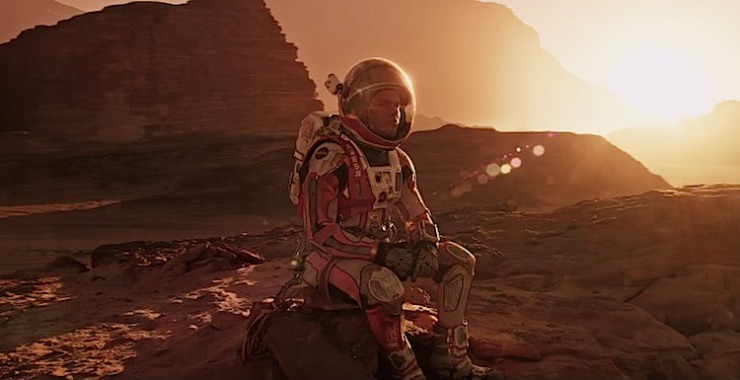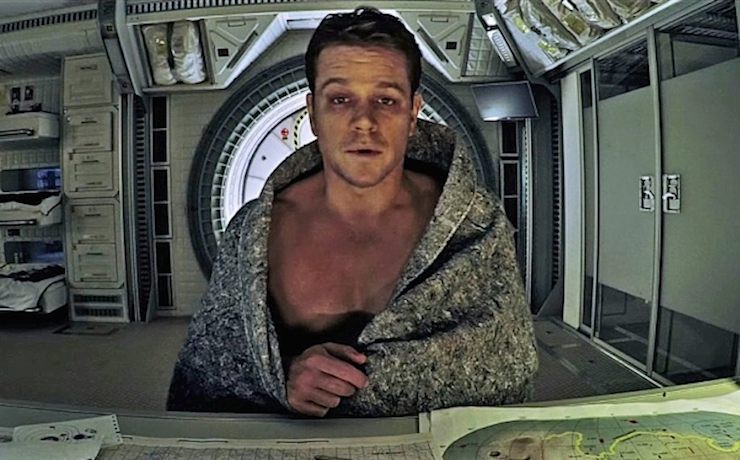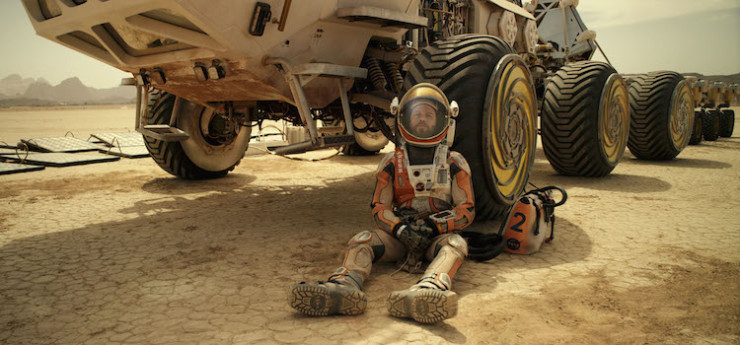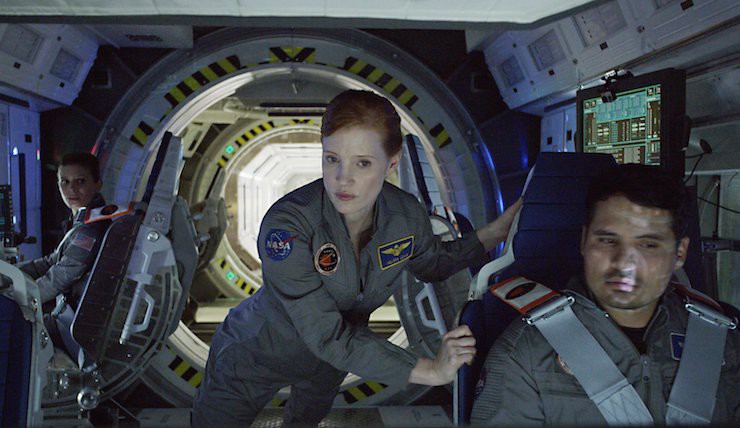Let me begin with the obvious: The Martian is a great, tense, often terrifying tale of survival and ingenuity. It’s a celebration of the human desire to explore in the face of doom, and it makes me wish I was better at science. It’s also hilarious. While the book was considered a little too techie at times (NASA loves it, astronauts love it, and if you watch Andy Weir’s Author Talk at Google you’ll see that the nerds over there really really love it) the story has been turned into a film that is accessible and often fun, without sacrificing scientific accuracy.
I’ll be discussing the movie in more detail below, so beware of spoilers, but up here I’ll just give you the bare outline: Mark Watney is a near-future astronaut, part of the six person Ares III mission, and the crew’s botanist. He, like most of the crew, is nerdy and funny, wielding the type of gallows humor that’s often popular with astronauts. After a storm hits the mission site, he’s presumed dead by the rest of the crew and left on Mars. When he wakes up and discovers this, viewers who haven’t read the book quickly learn that Watney attacks every setback with an engineer’s love of puzzle-solving, plus a deeply sarcastic sensibility.
Where Andy Weir’s book is a series of logs intercut with some back-home drama at NASA HQ after they realize their lost astronaut is still alive, the film allows the true beauty of Mars (played here by Wadi Rum in Jordan) to come through. Watney’s utter solitude is highlighted by director Ridley Scott’s trick of holding the camera tight to Watney as he inventories his supplies or cleans solar panels, only to pull back to show us that he’s trying to keep up a normal routine in an alien landscape, with no help or hope of escape. Matt Damon is the best possible Watney, infusing the character’s knee-jerk sarcasm with real warmth. He does an astounding job of balancing vulnerability with tough-mindedness, so each time you think the movie might tip into schmaltz it pulls back, but usually to emphasize his work rather than a quip.
There are no robot friends in this film. Unlike in Silent Running, Interstellar, even Cast Away—Watney never anthropomorphizes a machine or a volleyball. He is alone, and he doesn’t attempt to sugarcoat that by putting dunce caps on helper robots or drawing smiley faces on computer screens. And unlike in Moon, Interstellar, and 2001, we’re too near-future for plausible AI. Because of this Watney has to be his own ‘bot, riffing on the terrible 70s television and music that his crewmates left behind when they escaped, and providing a running commentary to all the cameras built into the HAB. The film creates a fascinating dichotomy in that while Watney is alone, he’s also under constant surveillance and thus seems to feel the need to perform, even though his presumed audience are astronauts of the future who won’t find these recordings until a much later mission. This aspect of his life obviously comes through better on film, where we can watch him walk between various cameras, muttering quips to himself all the while. We can also see the physical toll Mars is taking on him, which the journal entry format of The Martian couldn’t do.
Another surprising improvement is the use of music. Where in the book, Commander Lewis’ love of disco comes across as an easy joke, here the songs actually liven up the film in key moments, as well as being an incongruous expression of joy from a career military woman who seems to be very tightly controlled in her daily life.
Having said all of that, I’ll be the freak who says that (A) I really enjoyed the book and (B) the movie actually made me appreciate the book more. The 400 pages of the book brought me into the utter bare knuckle struggle of surviving on Mars for over a year. Where the film is able to do some quick cuts and pop up “7 months later” to let you know time has passed, the book took you through all of Watney’s preparations for the Rover trip, his rationing of food, and, in the final third, the point when he finally comes closest to cracking and starts indulging in long heated baths as a source of comfort. (This innocuous habit ended up carrying its own tension, as I began to wonder if he might just give up and let himself go under.) Plus, since the movie cut some of Mark’s commentary on the crew, by the end of the film I felt that we knew Commander Lewis, but the others remained a bit flat, where in the book Mark’s memories of them, not to mention his pilfering of their stuff, gives you a more three-dimensional portrait. There are even more near-fatal mishaps later on in the book—which probably would have been bad for the film’s pacing, but which also ratcheted up the terror, and forced Watney to come up with more awesome engineering solutions to problems that should have been insurmountable. It really hammered home the idea that life on Mars is impossible. For now.
Many of the reviews of the book lament that fact that Weir never allows Watney to become more philosophical. He starts out sarcastic and inventive, and by the last page of the book, he’s still sarcastic and inventive (albeit much thinner from subsisting on an all-potato diet for months) and he doesn’t really reflect on his time on Mars in any deeper or more emotional way. Watney never asks “why are we here” or “why did this happen to me,” because he already knows the answers to those questions: He volunteered for the mission. He was left behind by accident. And as for any bigger existential musings, well, they’re not going to help him get home, are they? If you read the book and considered that lack of reflection a bug, not a feature, the movie does improve on this is a few subtle ways. Simply by virtue of being portrayed by an actor Watney shows more emotion, and Damon does a fantastic job at letting the terror of his situation seep into the performance. The enormity of his situation, and the fears of the people back home, also act as a counterbalance to his snark.
An interesting exercise is to compare The Martian with the other recent stranded in space movies, Gravity and Interstellar.
I loved Gravity. I saw it in IMAX 3D, not something I usually do, and it was more an experience than a movie. And I also liked it because of the type of person I am. I’ve asked “What is the meaning of all this” type questions in response to breaking Star Wars commemorative glasses. It’s just my natural response to life. In Gravity, Sandra Bullock’s reaction to being stranded is, essentially, spiritual. Faced with her own lonely death, her first thoughts are to believe that her daughter still exists on a different plane of existence, and to worry that she doesn’t know how to enact religious ritual. Her turn to science only comes after a dream that she interprets as someone returning from the dead to help her. Watney’s reaction to being stranded on Mars is, essentially, materialistic. His immediate thought, once he deals with his wound, is to take stock of his supplies, do the math for the next Ares mission, and start using science to try to prolong his life. Bullock weeps, looks backward at her life with her daughter, and wonders whether she should bother living at all. Watney cracks jokes, listens to disco music, and relentlessly works to get home. IIRC, in the book he does actually have a suicide plan, but that’s only for after his food and water are gone, and there’s no hope.
In Interstellar, NASA is operating in secret on a tiny budget, trying to save the human race from extinction. The higher-ups lie to the main character about his mission, one of the two astronauts is a neo-mystic who believes that the mission is being guided by love, and the whole plot is driven by a fuzzy conception of five-dimensional beings who are trying to save our primitive three-dimensional asses from our own stupidity. There’s a wormhole that leads to a bookcase, and the secret ingredient is love, and occasionally the movie just stops dead to homage the shit out of 2001. I loved this one too—I think it’s an incredibly exciting film, and when it chose to get science right, it got it really right, and when it chose to go full L’Engle, I was willing to go with it. However, Interstellar is in many ways a dystopia. Mankind is no longer exploring—in fact, U.S. history textbooks are required to say that the Apollo program was a hoax meant to intimate the Russians—and the tiny, underground space program exists only to salvage a last vestige of humanity. No one has any hope for the future, only contingency plans. Maybe even more troubling is that no one mentions other countries. The U.S. seems to be alone in trying to preserve humanity, and there is no sense of world unity. In the near future of The Martian, NASA is sending regular missions to Mars, China has a healthy space program of its own, and the entire world unites in concern for Watney.
And to return to Gravity for a moment—Sandra Bullock has a dream where a grizzled space veteran tells her how to save herself. Obviously, Cuarón leaves this open for the viewer; if you want to believe that Clooney came back from the dead on a rescue mission, you can, or you can believe that Bullock’s mind is accessing her training while she’s unconscious, because it’s free to dredge up memories now that she’s not consciously panicking. In Martian, the grizzled space veteran stays firmly on the ground and on the computer, and sends the Hermes instructions for a potential flight plan to rescue Watney. The crew weighs the options, but it’s Commander Lewis who approves it, and in the end, executes it. She’s the leader for a reason—the most competent, coolest under pressure, and also the least likely to crack a terrible joke. Mark’s botany powers and wit kept him alive on Mars, but it’s the cool head of Commander Lewis that gets him back home.
None of this is to say that the film is perfect.
There is a moment when one ASTRONAUT turns to another ASTRONAUT, and says, with no irony, “Speak English!” That’s my second biggest critique actually, that moment made me groan out loud in the theater. My biggest critique is that Mindy Park, whom I thought was Korean-American, is played by the fantastic-but-not-Korean Mackenzie Davis (Cameron from Halt and Catch Fire), and the at-least-half-Indian Venkat Kapoor is turned into Vincent Kapoor, and is played by Chiwetel Ejiofor. Ejiofor is amazing, and in many ways as much the heart of the film as Damon, but it was frustrating to see the film swapping out nationalities in this way.
Now to put that in a slightly more hopeful context: the film The Martian most resembles, the thing that’s being homage the most heavily, is Apollo 13. That film mirrored the true events quite closely, and presented an all-male, blindingly white, mostly crewcut NASA, the terrified but perfectly coiffed wives of Jim Lovell and Fred Haise, and the almost entirely white and reassuringly male media (there are a few women and African American reporters in the press room), plus the worried Grumman rep, who is the Doughiest of All Doughy Men. Maybe most telling, when the world expresses concern for the Apollo astronauts, the U.S. responds that they’ll ask for help if they need it. In contrast, The Martian presents a near future with a racially diverse NASA, where a woman is the first to realize Watney’s alive, where the engineers consult with the frazzled nerds of JPL rather than any company reps, where the Ares crew is made up of four men and two women, with a woman in the Command role, and, again maybe most important, the China National Space Administration steps in with an offer of help which is gratefully accepted by NASA. As someone who grew up with the white, whiskey-swilling heroes of The Right Stuff and later Apollo 13, it’s nice to think of kids watching this latest spate of space movies and seeing astronauts from all different cultures and backgrounds.
In the end this is The Martian‘s greatest achievement. Rather than taking us into dystopia that needs to be cured, or cheerleading optimism without grounding progress in science (:cough: Tomorrowland :cough:) it gives us a vision of one world where intelligence and competence can save a man’s life in the face of impossible odds, and another world where that intelligence and competence is celebrated.
Leah Schnelbach is not yet a steely-eyed missile man, but she’s working on it. Come follow her personal logs on Twitter!













